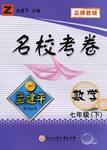题目内容
第二节: 完形填空(共20题,每题1.5分,满分30分)
It is generally accepted that the experiences of the child in his first years largely determine his character and later personality. Every 36 teaches the child something and the effects are increasing.
" 37 " normally used to refer to the treatment and training of the child within the home. This is closely 38 the treatment and training of the child in school, which is usually distinguished (区别) by the term "education". In a(n) 39 such as ours, both parents and teachers are 40 for the chances (provided for the development of the child),41 upbringing and education depend on each other.
The ideals and practices of child upbringing are different from culture to culture. 42 , the more rural the group, the more 43 the customs of child upbringing. In more technologically developed societies, childhood and adolescence (青春期) are likely to 44 a long time, 45 more chances for education and greater variety in 46 development.
Early upbringing in the society is naturally 47 both by the cultural pattern of the group and by the parents’ 48 and their aims and depends not only on school education but also on the __49 abilities of the child. Wide 50 of intelligence and character ___51 even in children of the same family.
Parents can find out 52 is normal in physical, mental and social development, by 53___ some of the many books 54 on scientific knowledge in these areas, or by comparing 55 with friends and relatives who have children.
36 A. discrimination B. failure C. experience D. success
37 A. Future B. Upbringing C. Fortune D. Ideals
38 A. devoted to B. covered with C. kept up D. related to
39 A. society B. home C. team D. environment
40 A. energetic B. prepared C. responsible D. hopeful
41 A. but B. so C. otherwise D. while
42 A. Besides B. Surprisingly C. However D. Generally
43 A. unchangeable B. curious C. undivided D. unusual
44 A. waste B. spend C. cover D. desire
45 A. hoping for B. resulting in C. waiting for D. beginning with
46 A. education B. body C. brain D. character
47 A. affected B. developed C. encouraged D. inspired
48 A. argument B. description C. ability D. encouragement
49 A. ordinary B. born C. normal D. acceptable
50 A. improvements B. disadvantages C. developments D. differences
51 A. exist B. reduce C. increase D. control
52 A. who B. which C. what D. that
53 A. holding out B. referring to C. taking up D. looking into
54 A. based B. amused C. decided D. marked
55 A. answers B. books C. notes D. letters
36-40 CBDAC 41-45 BDACB 46-50 DACBD 51-55 ACBAC
解析

 孟建平名校考卷系列答案
孟建平名校考卷系列答案 boy I had a crush on. He was one of the cutest (bright) guys at Neptune High. Although we were in some of the same classes, Dennis had 44 taken any notice of me.
boy I had a crush on. He was one of the cutest (bright) guys at Neptune High. Although we were in some of the same classes, Dennis had 44 taken any notice of me. allowed
allowed